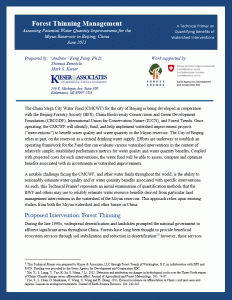A Technical Primer for Quantifying the Benefits of Watershed Interventions: Forest Thinning Management
By “Andrew” Feng Fang, Thomas Zimnicki, Mark S. Kieser - Kieser & Associates View PublicationThe China Mega City Water Fund (CMCWF), was formally launched in August 2015 by the city of Beijing in cooperation with the Beijing Forestry Society (BFS), China Biodiversity Conservation and Green Development Foundation (CBCGDF), International Union for Conservation Nature (IUCN), and Forest Trends. The goal of the CMCWF is to identify, fund, and implement watershed improvement projects (watershed interventions) to benefit water quality and water quantity in the Miyun reservoir, a major water source for residents of Beijing. A notable challenge facing the CMCWF and other water funds around the world is reasonably estimating water quality and/or water quantity benefits associated with specific watershed interventions. This Technical Primer represents an initial examination of quantification methods that the CMWF can use to reliably estimate the water quantity benefits derived from forest thinning management, the targeted removal of trees and other vegetation in order to achieve increase water yield. Kieser and Associates, a US-based environmental consulting firm and author of this primer, designed a methodology that the CMCWF could use now, based on existing data and without requiring substantial investment in hydrological monitoring. The CMCWF has developed an operating framework that evaluates project using these relatively simple water quantity performance metrics to guide project investments in the watershed. This technical primer has been developed specifically for the ecological and hydrological context of the Miyun Reservoir, but can serve as a model for project developers or researchers to develop methodologies for quantifying the benefit of locally-relevant watershed interventions in their specific context.

